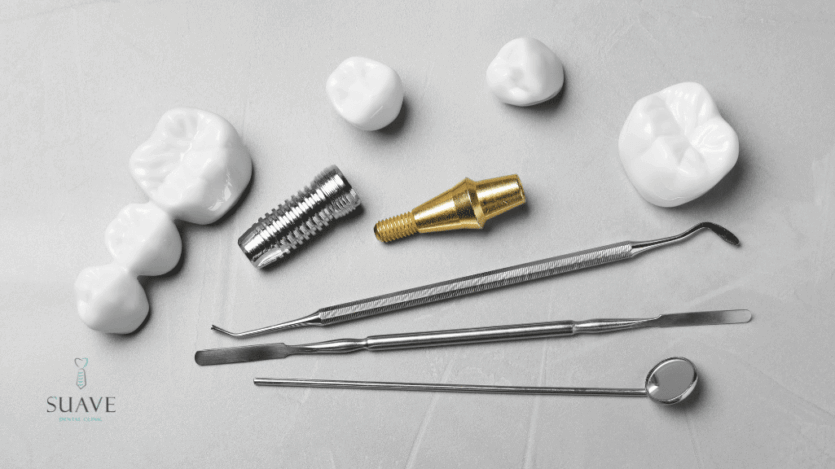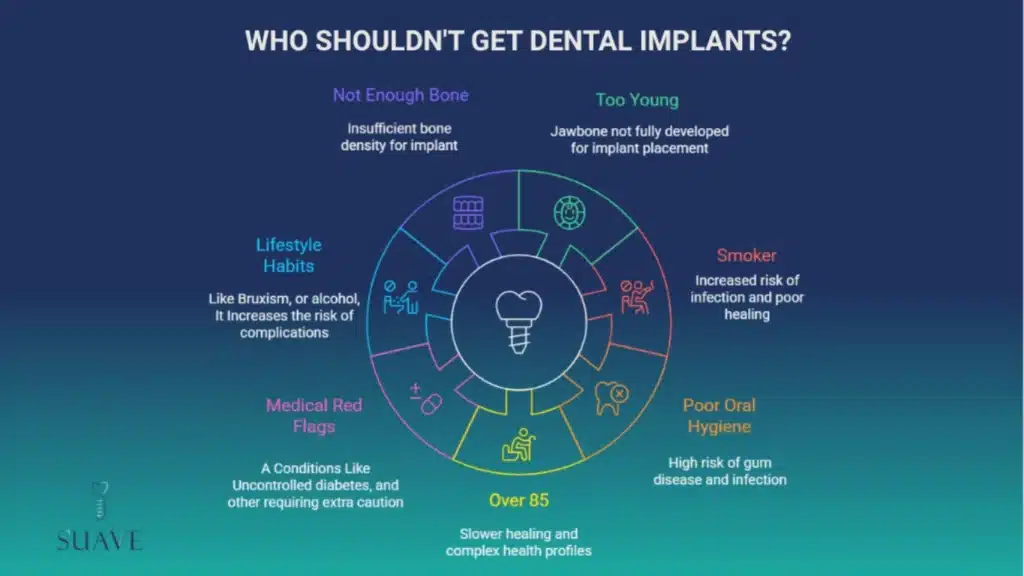
Table of Contents
Your tooth is lost—now what? After you have lost one or more of your teeth, the word “dental implant treatment” pops up in their mind.
It’s the go-to solution these days, and although dental implants are effective, they’re not the only option on the table.
They may not even be the best choice for replacing missing teeth. If you are confused about dental implants because of their budget or aggressive surgical procedures, or are just curious about other dental implant substitutes.
This article gives you the full picture beyond dental implant treatment options, and provide you with effecient alternatives to dental implants.
Let’s explore the non-surgical alternatives to dental implants that Sauve Clinic offers at more affordable prices than dental implant costs.
Everyone has their situation, and we get that. That’s why we will provide you with a list of dental implant alternatives—so you can find the right fit to bring back your smile and keep your mouth healthy.
Who shouldn’t get dental implants?
Even though Dental implants boast a success rate of around 95% as a long-lasting solution for replacing missing teeth, that number only applies to people who’ve already passed a thorough screening process.
In other words, it’s not one-size-fits-all. There are several reasons why a dentist would never recommend an implant but might recommend fixed options other than dental implants, for these reasons:
- Too Young – Jaw’s Still Growing
If you’re under 17 (girls) or under 19 (boys), your jawbone likely isn’t fully developed. Placing implants too early can lead to complications in jaw growth, so teens usually need to wait or explore temporary solutions like bridges or partial dentures. - Smoker – A Major Red Flag!
Whether you smoke, vape, or chew, nicotine limits blood flow and dries out your mouth, they are the recipe for implant failure.
It slows healing and makes infections more likely, especially during that crucial first phase of implant integration. Also, be aware that many dentists won’t proceed unless you commit to quitting smoking first. - Poor Oral Hygiene – Time for a Change!
If your tooth loss was caused by gum disease or neglected oral care, you’ll need to show that you’ve improved your oral care habits. Implants can’t get cavities, but the surrounding gums and bone can still get infected.
Daily brushing, flossing, and regular cleanings are non-negotiable. - Over 85 – Age Isn’t a Dealbreaker — But…!
Older patients often have slower healing and more complex health profiles. It’s a case-by-case and not a rule, but you should choose the best option with your dentist. - Medical Red Flags You Can’t Ignore
Certain conditions don’t necessarily rule out implants, but they do require extra caution:- Uncontrolled diabetes results in poor healing and a high infection risk.
- A weakened immune system causes healing to become unpredictable.
- Radiation therapy (jaw/head area), which leads to that bone, may not recover well post-surgery.
- Bisphosphonates (e.g., Fosamax, Boniva), which are bone medications (especially IV), can cause osteonecrosis, a condition that compromises jaw healing.
- Lifestyle habits that drop your chances
- Heavy alcohol or drug use lowers healing and increases infection risk.
- Bruxism (teeth grinding) puts dangerous pressure on implants.
- Trismus (limited jaw opening) may make the surgery physically unfeasible.
- Not Enough Bone
Your jawbone is the foundation of any implant. Without enough density or volume, there’s nothing to anchor it; that is why some dental implants need prior extra surgeries, such as Sinus Lift and bone grafting surgery.
Also may lead to more invasive options like zygomatic implants or implant-supported dentures, in cases of intensive jaw bone loss- Long-term tooth loss
- Gum disease
- Age
- Osteoporosis or radiation therapy
- Money talks, why are dental implants so unaffordable?
Dental implants aren’t a quick fix, they’re an investment with a higher cost, including the extra cost of:- Bone graft (if needed)
- Implant placement
- Healing phase: usually this phase takes between 3–6 months, and traveling 2 times from your home country
- Final crown or denture

Most barriers to dental implants aren’t permanent. Even if you’re not a candidate right now, with the right plan, paired with the right dental team, it can get you there.
What are the best affordable alternatives to dental implants?
If you don’t want to have dental implants, or you can’t afford them. At Sauve Clinic, we offer the best alternatives to implants for missing teeth replacement.
Take the chance and book a free consultation with our experts and professional dentists, and the most affordable options for your missing teeth according to your budget, bone health, and the aesthetics you are aiming for. Here are 7 less invasive options for teeth replacement:
1. Dental Bridges
The fixed dental bridges option uses adjacent natural teeth to support the abutment, replacing the extracted tooth. Dental Bridges are ones of the most widely used alternatives to dental implants in the dental clinics.
Advantages:
- Fixed, permanent, and long-lasting natural-looking
- No surgery required
- Faster treatment time
- Good material quality, resistant to stain and fracture, as zirconia and ceramics
Disadvantages:
- Involves healthy tooth reduction
- It doesn’t prevent bone loss
2. Bonded Bridge (Maryland Bridge)
This conservative option uses metal or ceramic “wings” bonded to the back of adjacent teeth, requiring little to no enamel removal. And it’s the Best for: A single front tooth replacement, especially in teens or young adults.
Advantages:
- Less invasive options for teeth replacement
- Quick and cost-effective
- Good aesthetics as an alternative to dental implants for front teeth.
Disadvantages:
- Less durable under bite pressure
- May be loose and need re-bonding over time.
3. Removable Partial Denture (Full denture / partial denture)
Removable dentures can replace multiple or all missing teeth.
Advantages:
- It’s the most affordable solution as a cheap alternative to dental implants
- Non-invasive and reversible
Disadvantages:
- Removable (can deviate or feel bulky)
- It doesn’t prevent bone loss
- Needs ongoing maintenance
4. Flippers (Temporary Partial Denture)
A flipper tooth is a temporary, light version of a partial denture. Flippers are best for those who looking for a temporary solution to hold the place of a missing front tooth while planning a more permanent option or during the healing of a surgery.
Advantages:
- Instant Smile Restoration
- Budget-Friendly and is considered an affordable dental implant alternative
- No Alteration Needed: Adjacent teeth remain untouched.
Disadvantages:
- Less Stability: Designed mainly for aesthetics and not for heavy chewing.
- Bulky Feel: Its base is acrylic, making you feel less comfortable due to its thickness.
- Fragile
Get A Free Dental Consultation
Get A Personalized Treatment Plan and Quotation
5. Immediate Implants
Same-day implants combine tooth extraction and implant placement in one visit. By anchoring directly into the fresh socket, the implant achieves early stability, allowing for temporary restoration (like a bridge or denture) right away.
It’s best for patients with several missing teeth and good bone density who are searching for quick, permanent outcomes.
Advantages:
- Immediate function and aesthetics
- Fewer dental visits
Disadvantages:
- Not suitable for all patients
6. Mini Implants
Mini implants are smaller, less invasive versions of conventional implants. They require less bone and are placed in a single appointment, often without incisions and are considered as non-surgical dental implants. They are suitable for patients with limited bone support or who want a faster, more affordable option.
Advantages:
- Minimally invasive
- Cost-effective tooth replacement
- Great for supporting dentures
Disadvantages:
- Not the best choice for heavy biting forces
- May not last as long as regular implants
7. Root Canal Treatment
When the tooth is damaged or infected but still restorable, root canal therapy removes the infection and allows you to retain your natural tooth with a crown. Root canal treatment could be followed by building up the damaged teeth with a post and core build up which helps avoid tooth extraction.
Advantages:
- Preserves natural tooth
- Less invasive than replacement
- Often cheaper than implants
Disadvantages:
- Treated teeth may be weaker
- Could require retreatment
8. Doing Nothing
You can do nothing and don’t replace your missing teeth, and to avoid dental implant surgery, if you can’t afford a fixed dental bridge, or immediate implants.
What happens if you simply ignore the gap?
Doing nothing might feel like the easiest route, but your smile and your bite might not agree in the long run.
Here’s what can happen if the space is left empty:
- Moving of your teeth: Nearby teeth can shift or lean into the gap.
- Bite problems: Your bite could gradually become misaligned
- Bone fade: Shrinkage of the jawbone
- Changes in your smile: As time passes, the gap may become more obvious and have an impact on how you look.
Sometimes, doing nothing can occasionally result in more serious problems later. If you are unsure, it’s always worth having a visit to your dentist to discuss the available options that suit you.
Can I find alternatives for dental Implants through dental tourism in Turkey?
Looking for dental care that doesn’t cost a fortune – or require invasive surgery?
At Suave Dental Clinic in Turkey, you are welcome to world-class care that offers budget-friendly solutions in one unforgettable trip. Our clinic specializes in smart, safe, and stunning, cheap options for missing teeth without implants.
Why Should I Choose Dental Tourism in Turkey?
- With our Dental Tourism Packages in Turkey save up to 50 % on treatments compared to UK, US, and EU prices.
- Experts in dental care treatment who are multilingual speakers are waiting for you.
- Recovery and enjoying the beauty of Turkey while healing.
- Quick appointments and no long waiting lists.
Ready to Smile Without Worry?
Let us help you discover the most suitable alternative to dental implants with fair pricing and tailored consultation just for you, in the Turkish way.
Reserve your dental holiday now – and smile with more confidence.
Alternatives to Dental Implants FAQs
What are the top budget-friendly holistic alternatives to dental implants?
You should consult your dentist and discuss the holistic options for replacing missing teeth, other than dental implants, such as
Flipper Tooth (Temporary Partial Denture)
Dental Bridges
Removable Partial Dentures
Do dental implant alternatives prevent bone loss?
No, Most dental implant alternatives do not prevent bone loss, and here is why:
Dental implants are the only tooth replacement option that stimulates the jawbone, thanks to the way they integrate with bone (a process called osseointegration). This stimulation helps to reduce the natural bone loss that occurs after tooth extraction.
Here is how common alternatives differ:
1- Bridges improve function and aesthetics, but do not stimulate the bone below the gum.
2- Dentures, whether full or partial, can cause bone loss due to their stress on the jaw.
3- Mini implants offer some stimulation, but not as much as standard implants due to their smaller size.
4- Root Canal Treatment: If the tooth is preserved, the root remains in place, preserving the surrounding bone.
Therefore, without surgical implants, the BEST OPTIONS for Bone Health are:
Root canal treated teeth When feasible, maintaining the health of your gums or obtaining root canals to save natural teeth and bone.
Bridges supported by implants like all-on-4 dental implants (fewer implants but still promote bone formation)
Mini implants (in some specific situations)
References
Medically Reviewe